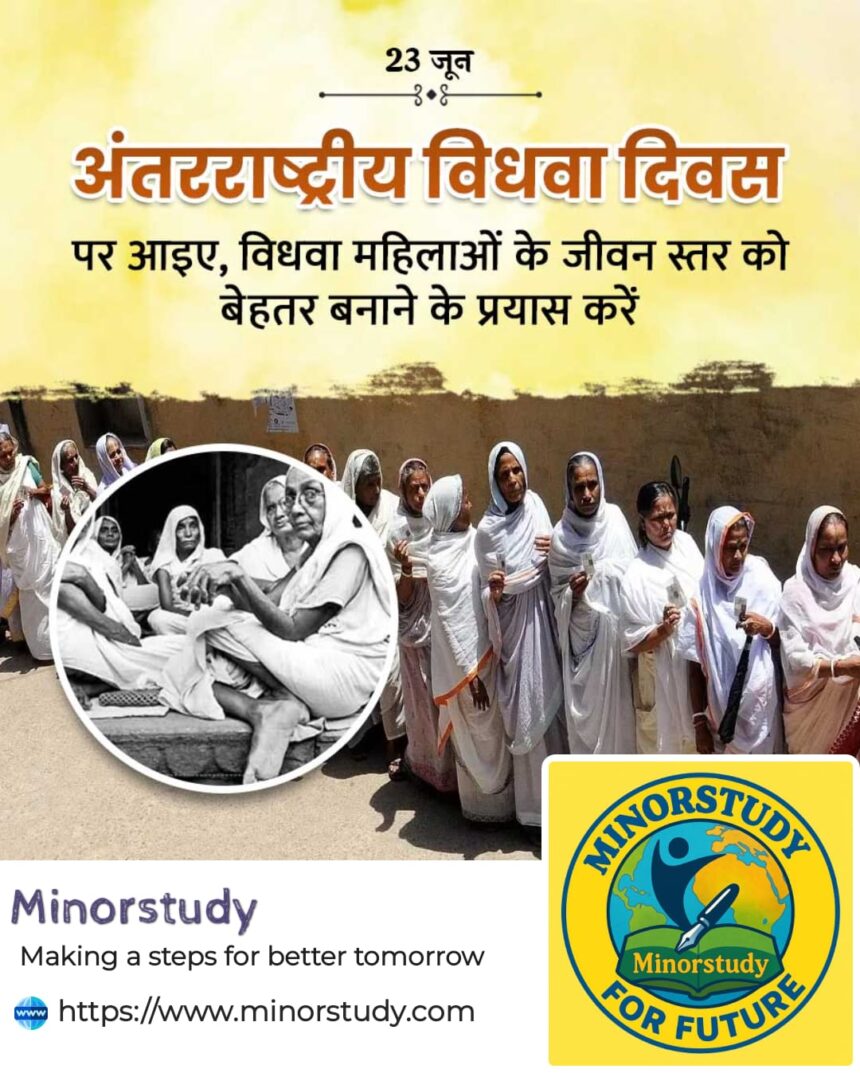💔 International Widows Day: 7 Heartbreaking Realities and Hopeful Actions for a Better Tomorrow
International Widows Day: Every year on June 23rd, the world comes together to recognize the invisible suffering of millions of women who have lost their spouses. International Widows Day is not just a commemoration—it’s a call to action, a day to acknowledge the systemic discrimination, economic hardship, and social stigma that widows often face, especially in the developing world.
- 📜 History of International Widows Day
- 📊 7 Shocking Facts About Widows You Should Know
- 📅 Timeline of International Widows Day
- ❓ Frequently Asked Questions (FAQs)
- ❓ Why is International Widows Day observed on June 23?
- ❓ What is the aim of International Widows Day?
- ❓ Who organizes events on this day?
- ❓ How can people support widows meaningfully?
- ✨ Significance of International Widows Day
- ❤️ Importance in Our Lives
- 🕊️ How to Observe International Widows Day
- 🌼 Wishing Message
- 🧩 Important Points Summary
- 💥 7 Heartbreaking Realities and Hopeful Actions (Revisited)
- 💡 Daily Life Impacts
- 🧠 Conclusion: Transforming Loss Into Leadership
In a world that values marital status and patriarchal structures, widowhood can feel like a social death. But this day reminds us: widows are survivors, mothers, workers, and humans with rights.
📜 History of International Widows Day
The Loomba Foundation, led by Lord Raj Loomba, initiated International Widows Day in 2005 in memory of his mother, Pushpa Wati Loomba, who became a widow at the age of 37. The organization recognized the untold suffering that women endure after the death of their husbands—especially in Asia and Africa, where widowhood can lead to ostracism, poverty, and exploitation.
In 2010, the United Nations officially adopted June 23rd as International Widows Day through UN General Assembly Resolution A/RES/65/189. This marked a historic shift in acknowledging the rights of widows as a global human rights issue.
📊 7 Shocking Facts About Widows You Should Know
Over 258 million widows exist globally, according to UN Women.
Nearly 1 in 10 widows live in extreme poverty.
Many widows lose inheritance rights in patriarchal cultures.
In some societies, widows are subject to ritual abuse and forced isolation.
Widows are often excluded from financial systems—no bank accounts, no credit.
Widowhood impacts education of children, especially girls.
COVID-19 increased the number of young widows, creating a new crisis.
📅 Timeline of International Widows Day
| Year | Event |
|---|---|
| 2005 | Loomba Foundation observes the first International Widows Day in the UK. |
| 2010 | UN adopts June 23 as official International Widows Day. |
| 2015 | UN Women begin data tracking of widows globally. |
| 2020 | Pandemic amplifies global widowhood issues—especially in India, Brazil, and Africa. |
| 2022 | Focus shifts to digital inclusion and financial independence for widows. |
| 2024-2025 | Emphasis on mental health support, legal protection, and education of widowed mothers and their children. |
❓ Frequently Asked Questions (FAQs)
❓ Why is International Widows Day observed on June 23?
Because Pushpa Wati Loomba, mother of the foundation’s founder, became a widow on this date in 1954. It’s a symbol of personal pain turned into global action.
❓ What is the aim of International Widows Day?
To raise awareness about the injustices faced by widows and to mobilize support, policy reform, and community action to uphold their rights and dignity.
❓ Who organizes events on this day?
Primarily the Loomba Foundation, UN Women, NGOs, governments, women’s groups, and social justice organizations around the world.
❓ How can people support widows meaningfully?
Advocate for widow rights.
Provide skill training or employment opportunities.
Challenge social taboos and stigmas.
Donate to organizations helping widows and orphaned families.
✨ Significance of International Widows Day
Human Rights Recognition
For too long, widowhood has been treated as a personal loss, not a public issue. This day reframes it as a rights-based issue.Breaking the Stigma
Widows, especially in traditional societies, are often seen as “inauspicious” or “bad luck.” The day aims to break such toxic cultural stereotypes.Policy Change Catalyst
It pushes lawmakers to think about widow pensions, inheritance rights, housing, and safety.Global Solidarity
It builds international cooperation, helping countries learn from each other to support widows better.Empowering the Forgotten
By shining light on widowhood, the world empowers millions of women living in the shadows.
❤️ Importance in Our Lives
👨👩👧👦 Family and Society
In many homes, widows are sole breadwinners. Supporting them means protecting families, preserving children’s futures, and stabilizing communities.
📚 Education
Widows often struggle to educate their children due to financial hardship. Ensuring their inclusion means breaking intergenerational poverty.
💼 Economic Impact
When widows are empowered to work, they contribute to local economies, pay taxes, and uplift entire neighbourhoods.
🧠 Emotional Wellness
Grief is universal. Recognizing widowhood builds a more compassionate society where mental health and dignity are prioritized.
🕊️ How to Observe International Widows Day
Host Storytelling Sessions
Give widows a platform to share their journeys—grief, survival, and success.Organize Legal Aid Camps
Many widows lack access to basic legal advice. Help them claim land, pensions, or custody.Support Skill Building Programs
Enable them to learn new skills and restart their careers.Social Media Campaigns
Use platforms to share widow stories, raise awareness, and break taboos. Use hashtags like #InternationalWidowsDay #SupportWidows.Educate Young People
Schools can conduct sessions to sensitize students about gender equity and compassion.
🌼 Wishing Message
“On this International Widows Day, let us remember the strength behind silent struggles. May we work together to bring dignity, justice, and opportunity to every widow around the world.”
🧩 Important Points Summary
Date: June 23 every year
Declared by: United Nations, 2010
Founded by: Loomba Foundation
Global Issue: 258+ million widows, many face social and economic discrimination
Observance Goal: Awareness, Policy Reform, Social Inclusion
Call to Action: Respect, Uplift, Empower
💥 7 Heartbreaking Realities and Hopeful Actions (Revisited)
| Reality | Hopeful Action |
|---|---|
| 1. Social ostracism and isolation | Community support groups and reintegration programs |
| 2. Lack of legal rights | Free legal aid and law reform |
| 3. Financial vulnerability | Access to micro-loans, pensions, job training |
| 4. Cultural taboos | Awareness campaigns and cultural reform |
| 5. Mental health issues | Trauma counselling and grief therapy |
| 6. No education for children | Scholarships and free education |
| 7. Invisible in data and policy | Inclusion in national databases and planning |
💡 Daily Life Impacts
For Widows: Greater visibility leads to improved support systems, healthcare, and respect.
For Communities: When widows thrive, children stay in school, families are healthier, and local economies flourish.
For Nations: Recognizing widows in policymaking builds inclusive societies, a major UN Sustainable Development Goal.
🧠 Conclusion: Transforming Loss Into Leadership
International Widows Day is not about sorrow alone. It’s about resilience, dignity, and reform. Behind every widow is a story of courage in the face of loss, and often, strength no one sees.
This day urges the world to see widowhood not as an end, but as a turning point toward empowerment. By breaking silence, ending stigma, and offering opportunity, we not only help widows—but uplift humanity itself.
So today, let’s go beyond sympathy. Let’s choose solidarity, systemic change, and above all—respect.









Отчёты по практике https://gotov-otchet.ru на заказ и в готовом виде. Производственная, преддипломная, учебная.